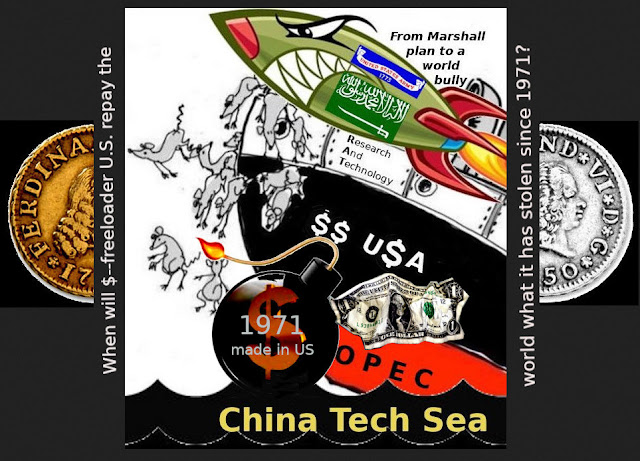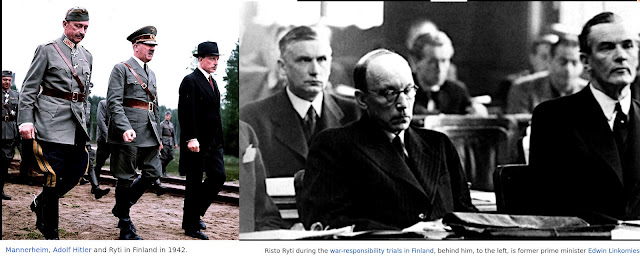Peter Klevius: EU is in reality like a faulty* twin with China and has almost nothing (except dangerous militarism) in common with US anymore - yet EU politicians act against the best for the people.
*
EU Commision doesn't even come close to the Chinese Communist Party
when it comes to support from the people. And no, it's not China but EU
that has an increased need for propaganda, censorship and
misinformation. In fact, modern technology inevitably leads to a system
similar of China - with the exception that China's is smoother and
produces much less tension and criminality. It's sickness to try to
connect today's China with the horrors of post WW2 that was a
consequence of Western and Japanese militaristic meddling.
EU
(research): Europe’s footprint in digital technology is much weaker
than that of the U.S. On the one hand, this requires Europe to seek
cooperation, primarily with democracies. On the other hand, Europeans
find it even more difficult to decouple from Chinese technology supply
chains.
Peter Klevius: Does "primarily with democracies" mean
that EU is OK with islamist dictator states like Saudi Arabia and othe
Gulf states, but for some reason (US) can't seek cooperation with China!
And why should EU decouple from Chinese technology? Because US says
so?!
EU: China is very clear about what it aims to achieve with
its digital tech stronghold. Digital technology is supposed to
strengthen the party-state from generating prosperity and social
stability to perfecting digital authoritarianism and projecting Chinese
power. Europe and the United States lack such a clear vision. This
should be a valuable starting point to collectively think about a broad
strategic vision alongside more narrow policies targeting specific
concerns and vulnerabilities.+
Peter Klevius: Is it bad to "be
clear"?! And how does EU's and US' "digital authoritarianism" differ
from the Chinese one? The first amendment has since long been made
meaningless in the US and doesn't even exist in EU. And why is China
"very clear about what it aims to achieve with its digital tech
stronghold. Digital technology is supposed to strengthen the party-state
from generating prosperity and social stability to perfecting digital
authoritarianism and projecting Chinese power" any different from EU and
US? And the deliberately bad sounding "to strengthen the party-state"
should be synonymous with the commision party state of EU - which has
less support from EU people though.
EU: While China’s digital
capabilities are rapidly rising, the country is not dominant yet.
Unquestionably, China has developed into an innovation powerhouse and is
central to global supply chains. However, China’s remarkable
achievements should not overshadow that – just like any other country –
China does not dominate the whole front and continues to depend on
foreign technologies. The country aims to tackle this by focusing on
strategic and emerging technological niches. China normally does not
tackle existing Western strongholds but rather aims to outcompete U.S.
and European rivals in fields that are just emerging.
Peter
Klevius: The litho machine that China wanted to buy from Holland was
denied by US who themselves can't produce one! The inevitable truth
however is that China's high tech development curve is steeper than that
of the West. So no matter where China is today - tomorrow it's far
ahead. And sooner or later ignorant Westerners start realizing it
despite the Goebbelian propaganda we are fed with.
EU: We find
that the four-dimensional prism we used to analyze challenges arising
from China’s growing digital footprint was extremely useful. The four
dimensions include an economic, a political, a security, and an
ideational angle. Each of these dimensions carry their own challenges
from an uneven playing field undermining European competitiveness to
political challenges arising from technological lock-in dependencies to
network security vulnerabilities and diverging values inscribed in
European and Chinese technologies and regulations.
Peter Klevius:
Why are "challenges arising from China but not from US?! And EU's
"diverging value" is nothing else than that EU supports Human Rights
violating islamism and accuses China of Human Rights violations when
China doesn't do the same!
EU: Europe is relatively
well-positioned vis-à-vis China when it comes to innovation and
research, but too often do we fail in turning innovation into invention.
Another weakness is fabrication. We should draw conclusions for
proactive policymaking as well as for defensive measures protecting
European innovation from this finding.
Peter Klevius:
"Well-positioned vis-à-vis China when it comes to innovation and
research". Really! "Defensive measures protecting European innovation"
was what created EU in the first place, when Japanese high tech
outcompeted the European one. To an extent that when Peter Klevisu
bought a fully analogue-digital Sony video camera 1997, it was
restricted by EU regulations so that one shouldn't be able to utilize
built in A/D converter. Why? Because EU didn't have any such tech
available. Already in the 1980s European companies started buying high
tech products from Japan and the placing their own brand on them before
selling to consumers.
EU: European dependence on Chinese digital
technologies varies across sectors. The global semiconductors supply
chain is collaborative across countries and regions. The U.S. dominates
chip design, and Taiwan fabrication. Testing and packaging are more
diversified with an increasing role for China. The EU is weak with the
exception of photolithography systems, machinery required for the
fabrication of chips. However, China is also not strongly positioned and
aims to catch up. Only if Taiwan was controlled by Beijing would the
balance tip against the EU and all other Western countries.
Peter
Klevius: It's only a question of time before the Taiwanese realize they
are better of together with China and with a similar system as Hong
Kong. When the mainland grass gets even greener, and the uglines of US
even more apparent, then the politics in Taiwan will change anyway. The
Taiwanese are Chinese after all.
EU: Europe continues to be a
global standardization power. It punches far above its economic weight
in international technical standardization organizations. The U.S., in
contrast, rather spreads its technical standards by means of market
power and strong industry consortia.
Peter Klevius: Compared to
stupid US which hasn't even learnt the metric system as yet. However,
China is bigger, faster and more developed than Europe - while having
similar edge in standardization etc.
EU: China is rapidly
catching up and has understood the strategic value of technical
standardization. It spreads its domestic specifications in international
standardization organizations but also as part of infrastructure
projects of the Belt and Road Initiative. Most worrisome is not only the
ongoing power shift but that China is also questioning the privately
driven approaches of the EU and the U.S. to standard-setting. In China,
technical standardization is a domain steered by the party-state and so
are China’s international activities.
Peter Klevius: Why is EU but not China allowed to be a global standardization power?!
EU:
The U.S. and the EU have quite different approaches to technical
standardization. This makes cooperation difficult. However, if
procedural issues can be put aside, both transatlantic partners could
focus on countering the uneven playing field with China, strengthen the
role of fundamental values, primarily human rights, in tech
standardization, and strive to prevent the bifurcation of technical
standards in strategic sectors. The latter is essential to prevent
developing countries getting even more locked into Chinese tech.
Peter Klevius: Nothing can be "put aside" with US because US is trapped in its $-fraud - and wants to drag EU into it as well!
EU:
In digital tech both common interests but also significant divergences
in perspective shape the transatlantic relations. Both sides should find
it easy, for example, to agree on the role of human rights protection.
Peter
Klevius: As long as US and EU support anti-Human Rights islamism it's a
blatant lie to talk abou Human Rights in China - especially when
there's no difference between Western and Chinese deradicalization
programs! Except that e.g. in UK the Prevent program has been declared
"islamophobic" which has led to many islamist terrorist attacks against
Brits that otherwise may have been preventable.
EU: Second,
Europe’s footprint in digital technology is much weaker than that of the
U.S. On the one hand, this requires Europe to seek cooperation,
primarily with democracies. On the other hand, Europeans find it even
more difficult to decouple from Chinese technology supply chains. The
challenges both sides face are not the same.
Peter Klevius:
China’s share of global R&D rose nearly 488 percent from 4.9 percent
in 2000 to 23.9 percent in 2019. If you see a vehicle fast speeding in
on you, you expect to see it passing you shortly, not stopping by your
side, right. From cloning to cancer research, from sea to space
exploration, China is using nanoscience and nanotechnology innovation to
drive some of the world’s biggest breakthroughs. Add to this a
relatively homogenous population and a homogenous regulatory system, and
you'll see the emptiness and pure ignorance or alternatively,
deliberaate misleading that EU politicians are guilty of.
The US
National Science Board’s warned in a recent report – State of US Science
and Engineering 2022 – that China is pulling ahead of the United States
when it comes to key indicators of science and engineering prowess.
The
US is falling behind China in important areas such as growth in
research-and-development investment, the manufacturing of critical
emerging technologies and patents for innovative systems, National
Defense reported.
China is also leading the US in knowledge- and technology-intensive, (KTI), industry manufacturing.
Scott
Moore: China is fast becoming a biotechnology powerhouse and a
perceived threat to the longstanding dominance of the United States in
the sector. In Washington, these developments have been greeted in much
the same way as China’s growing prowess in artificial intelligence and
other emerging technologies: with panic and punitive measures. Last May,
Florida Republican Senator Marco Rubio introduced the Genomics Data
Security Act, which would, among other actions, ban the National
Institutes of Health from funding China-affiliated entities. In
September, Arkansas Republican Senator Tom Cotton and Wisconsin
Representative Mike Gallagher called for “blacklisting” Chinese
biotechnology companies over concerns they may be attempting to gather
biomedical information on U.S. citizens for nefarious purposes. Just a
few months later, the U.S. government sanctioned 12 Chinese life
sciences research institutes and 22 private firms on security grounds.
There is a big problem, however, with these largely reactive,
security-focused responses. Biotechnology is an intrinsically
transnational and rapidly evolving sector that holds just as much
promise for mutually beneficial collaboration and cooperation as for
competition and contention. These distinctive characteristics of
biotechnology mean that Washington’s security-driven approach to China
and biotechnology risks harming U.S. competitiveness in the sector
instead of enhancing it, while also limiting America’s ability to share
in the development of mutually-beneficial technologies and work with
Beijing to address the shared challenges posed by rapid developments in
fields like gene editing. U.S. policy and strategy on China and
biotechnology must strike a better balance between addressing legitimate
concerns while maintaining the openness and innovation that underpin
America’s competitive advantage in emerging technology.
Peter
Klevius: It's no longer a question about "security" at all but instead
the realization that when US shortcomings become more obvious then the
trust in the dollar hegemony is at risk. US is in an extremely peculiar
position thanks to the now accelerating $-printing on the behalf of the
rest of the world since 1971 when US started its $-fraud. $-freeloader
US pulls the gun instead of trying to correct its ugly behavior.



